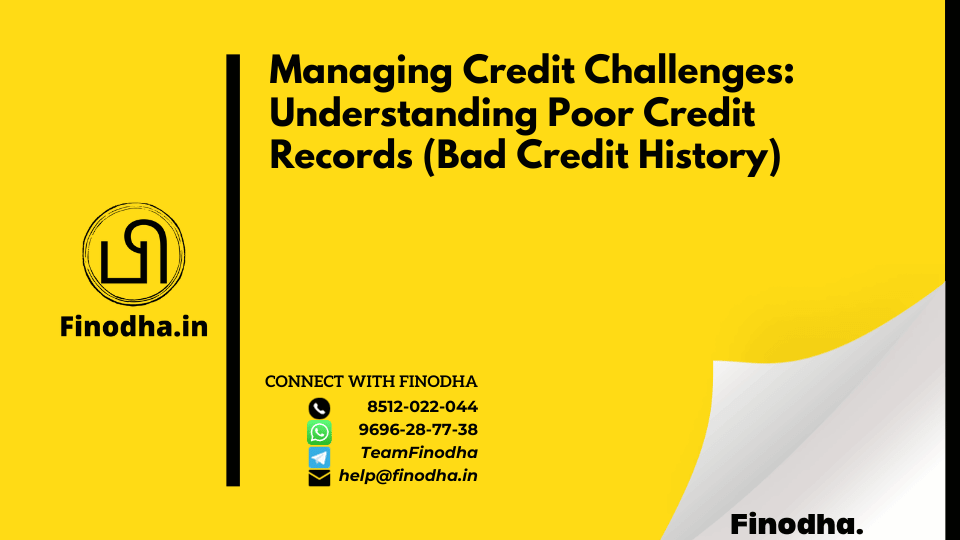Important Keywords: Bad Credit History, Credit Repayment Challenges, Financial Rehabilitation Strategies, Credit History Impact, Navigating Credit Difficulties, Financial Recovery from Poor Credit, Restoring Creditworthiness, Strategies to Improve Credit Score.
Table of Contents
Introduction: Managing Credit Challenges: Understanding Poor Credit Records (Bad Credit History)
Poor credit history reflects a borrower’s struggle to meet credit repayment obligations in the past. This financial track record raises concerns for credit agencies, potentially rendering the individual ineligible for new credit lines. This article delves into the nuances of poor credit history, its implications, and how borrowers can navigate this financial challenge.
Sub-headings with Short Paragraphs:
1. The Dilemma of Poor Credit History: Poor credit history stems from a borrower’s inability to honor credit repayments, leading to a tarnished financial record. This history is meticulously recorded by credit reporting agencies and influences a borrower’s future credit prospects.
2. Grasping the Impact of Credit History: Credit reports and scores play a pivotal role in evaluating an individual’s creditworthiness. Any defaults, late payments, or unfavorable credit records can significantly dent the credit score, making it difficult to secure new credit opportunities.
Advantages:
- Financial Awareness: Acknowledging poor credit history prompts financial reflection and strategic planning to improve one’s credit standing.
- Debt Management: Individuals with a history of credit challenges may seek debt consolidation or management solutions to regain financial stability.
- Long-term Improvement: Successfully overcoming a poor credit history sets a precedent for responsible financial behavior, potentially leading to improved credit scores over time.
Disadvantages:
- Restricted Financial Options: Borrowers with poor credit history may face limitations in accessing credit or loans, constraining their financial flexibility.
- Higher Interest Rates: When credit is approved, it often comes with higher interest rates, increasing the overall cost of borrowing.
Self-explanatory Bullets:
- Credit Reporting Agencies: Organizations that compile and maintain credit histories of individuals for assessment by credit companies.
- Credit Scores: Numerical representations of an individual’s creditworthiness, affected by credit repayment history.
- Loan Defaults: Instances where a borrower fails to repay a loan as per the agreed terms and conditions.
FAQ:
Q1: Can a poor credit history be improved? A1: Yes, with consistent efforts, a poor credit history can be improved. Timely payments, reducing debt, and responsible financial management can gradually enhance credit scores.
Q2: How long does poor credit history last? A2: Poor credit history can last up to seven years on the credit report. However, its impact lessens as time passes, especially if positive financial behavior is demonstrated.
Example:
Consider a young professional who faced financial difficulties during an economic downturn, resulting in missed credit card payments and loan defaults. These instances tarnished their credit history. Over time, with disciplined financial management and consistent payments, they managed to repair their credit history and secure a new credit card with a higher interest rate.
Key Takeaways:
- Poor credit history arises from past financial struggles and can limit future credit opportunities.
- Understanding the impact of credit history is crucial for improving financial standing and managing debt effectively.
- Efforts to rebuild credit can lead to better financial prospects in the long run.
Conclusion:
Poor credit history poses challenges for borrowers, affecting their creditworthiness and access to financial opportunities. However, by understanding its implications, taking proactive steps to improve credit behavior, and seeking professional financial guidance, individuals can navigate through these challenges and move towards a more secure financial future.
Tax Payable on 50 Lakhs Income | Find Out Now

Understand the taxes payable for ₹50 lakhs income, along with tips on managing tax liabilities effectively and exploring possible exemptions.
How to Register Private Limited Company in India

Discover how to register a private limited company in India with a step-by-step guide, simplifying the legal registration process for a smooth start.
What Is Accounting | Basics Simply Explained

Discover what accounting is and why it’s crucial for managing business finances, maintaining records, and ensuring clear financial reporting.
Popular Tags:
Capital gains (21) CGST (280) Chapter VI-A (15) e-Compliance Portal (21) E-Verify (20) economic growth (19) F&O Trading (29) F.No.354/117/2017-TRU (23) F. No. CBIC-20001/4/2024-GST (15) Financial planning (13) financial stability (16) GST (1458) IGST (223) Income from House Property (17) Income Heads (16) Income Source (14) Income tax (109) Income Tax Account (15) Income Tax Filing (20) Indian context (22) Indian investors (16) ITR-3 (19) ITR Form (20) P&L Statement (24) PAN (13) Risk Management (19) Salary Income (19) Section 7(1) UTGST Act 2017 (14) Section 8(1) UTGST Act 2017 (26) section 9 (18) section 10 (28) section 15 (13) section 25 (17) section 39 (24) section 49 (16) section 50 (16) section 51 (13) Section 52 (16) Section 54 (13) section 73 (21) section 74 (22) SGST (223) Speculative Income (14) Trading Income (33) UTGST (78)

